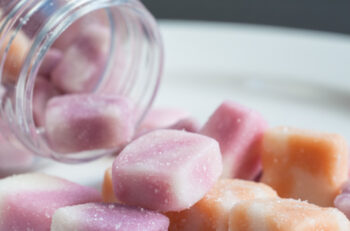
Teething is a natural process that babies go through as their teeth start to emerge through the gums.
It can be uncomfortable and sometimes distressing for babies and parents.
In this article, we will explore the duration of teething, the associated signs and symptoms, and provide tips on managing the discomfort effectively.
What is teething?
Teething refers to the process of primary teeth breaking through the gums.
The eruption of teeth can cause discomfort and irritability in infants.
As the teeth push through the gums, it can lead to soreness, swelling, and tenderness in the affected area.
When does teething typically begin?
Teething usually begins around six to eight months of age, but the timing can vary from one baby to another.
Some babies may start teething as early as three months, while others may not experience it until they are 12 months old. The order in which teeth erupt can also vary.
Signs and symptoms of teething
Several common signs and symptoms indicate a baby is teething.
These can include:
- Increased drooling
- Irritability and fussiness
- Swollen or sensitive gums
- Biting and chewing on objects
- Changes in sleep patterns
- Loss of appetite
- Mild fever
How long does teething last?
Teething can last for several months, but individual experiences may vary.
On average, teething can span from six months to three years, with most children having a full set of primary teeth by the age of three.
However, it’s important to note that the discomfort and symptoms associated with teething are temporary and typically subside once the tooth has fully emerged.
Factors that affect the duration of teething
Several factors can influence how long the teething process lasts for a baby. These factors include:
- Genetics: A baby’s genetic makeup can influence the timing and duration of teething.
- The number of teeth: Babies with more teeth to erupt may experience a longer teething period.
- General health: Illnesses or health conditions can sometimes delay the teething process.
- Individual variability: Every baby is unique, and the rate at which teeth emerge can vary.
Coping with teething discomfort
Parents can take several measures to help alleviate the discomfort associated with teething.
These include:
- Gently massaging the baby’s gums with a clean finger or a cool, damp cloth.
- Providing teething rings or toys that are safe for chewing.
- Using over-the-counter teething gels or medications, as advised by a pediatrician.
- Offering chilled foods or drinks to soothe the gums.
- Distracting the baby with gentle rocking, singing, or playing.
Teething remedies and tips
Here are some additional tips to help parents manage teething discomfort effectively:
- Ensure good oral hygiene: Clean the baby’s gums and emerging teeth with a soft, damp cloth or an infant toothbrush.
- Avoid numbing agents containing benzocaine: These products can harm infants and should be avoided.
- Provide appropriate teething toys: Look for toys specifically designed for teething babies, ensuring they are made of safe materials and do not pose a choking hazard.
- Stay calm and patient: Teething can be challenging for babies and parents, but remaining calm and reassuring can help ease the process.
Common misconceptions about teething
Several things could be improved surrounding teething. It’s important to separate fact from fiction to ensure accurate information.
Some common misconceptions include:
- Teething causes severe illness: While teething can lead to mild discomfort and irritability, it does not cause high fever, diarrhea, or other severe symptoms.
- Teething causes developmental delays: Teething may coincide with other developmental milestones but does not directly cause delays in a baby’s overall development.
- Teething requires medical intervention: In most cases, discomfort can be managed at home without medical intervention.
When to consult a healthcare professional
Although teething is a natural process, there are instances when it is advisable to seek medical advice.
Consult a healthcare professional if:
- The baby’s temperature rises above 100.4°F (38°C).
- The baby shows signs of severe discomfort or pain.
- The baby has diarrhea or vomiting.
- The baby is not eating or drinking adequately.
Teething and sleep disturbances
Teething can sometimes disrupt a baby’s sleep patterns from the discomfort it causes.
To help alleviate sleep disturbances during teething:
- Stick to a consistent bedtime routine.
- Provide comfort through gentle rocking or soothing music.
- Use teething remedies or pain relief methods as advised by a pediatrician.
- Ensure a comfortable sleep environment, maintaining optimal room temperature, and using appropriate bedding.
Teething and feeding difficulties
Teething can affect a baby’s appetite and feeding routine.
Here are some tips for managing feeding difficulties during teething:
- Offer chilled or room-temperature foods that may provide relief to sore gums.
- Try different textures of food to accommodate any discomfort while chewing.
- Be patient and understanding if the baby’s appetite fluctuates during teething.
Teething toys and their benefits
Teething toys can be helpful in soothing a baby’s sore gums. Look for toys that are:
- Made of non-toxic materials and free from harmful chemicals.
- Designed to be safe for chewing and without small parts that could pose a choking hazard.
- Textured or have different surfaces to provide varying levels of stimulation.
Teething in babies with special needs
Babies with special needs may experience teething differently.
It is essential to adapt and provide additional support during this time.
Consult with healthcare professionals caring for children with special needs to ensure appropriate guidance.
FAQs
Can teething cause a high fever in babies?
Teething may cause a slight increase in body temperature, but it typically does not lead to a high fever. If your baby has a fever above 100.4°F (38°C), consult a healthcare professional.
How can I tell if my baby’s discomfort is from teething or another issue?
Teething discomfort is often accompanied by swollen gums, increased drooling, and the desire to chew on objects. However, if you’re unsure, it’s best to consult a healthcare professional to rule out other possible causes.
Is it safe to use teething gels or medications for pain relief?
It’s advisable to consult with a pediatrician before using any teething gels or medications. They can guide you to safe and appropriate options for your baby.
Can teething cause diarrhea or vomiting?
While teething can lead to mild digestive disturbances such as drooling and loose stools, it should not cause severe diarrhea or vomiting. If these symptoms persist, seek medical advice.
How often should I clean my baby’s gums and emerging teeth?
It is recommended to clean your baby’s gums and emerging teeth twice a day using a soft, damp cloth or an infant toothbrush.
Conclusion
Teething is a natural process that occurs as babies’ teeth emerge through the gums.
While teething can vary, it typically lasts for several months.
Understanding the signs and symptoms of teething and implementing effective coping strategies can help babies and parents navigate this developmental milestone more easily.
Or:
- Call us at: 904-584-9004
- Email us at: info@welovebrightsmiles.com
Bright Smiles Pediatric Dentistry is located in St. Johns, FL, and Yulee, FL, and we happily welcome folks from neighboring areas.


